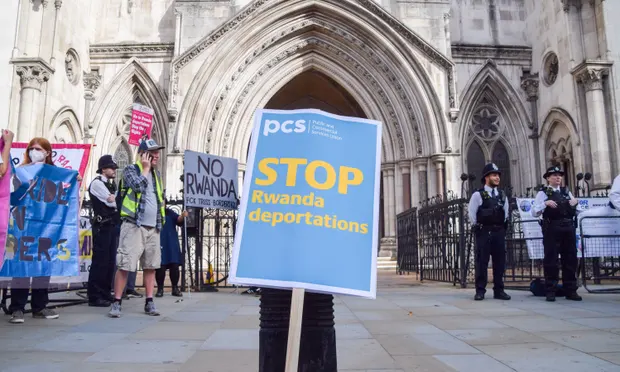The British government’s plan to send asylum-seekers to Rwanda faces a legal challenge in the High Court this Monday.
Human rights groups and labour unions filed a number of lawsuits arguing the policy is both illegal and immoral.
The lawsuits forced former prime minister Boris Johnson to cancel the first planned deportation in mid-June.
Johnson’s successor, former foreign secretary, Liz Truss, has already said she supports the plan.
In April the British government announced an agreement with Rwanda under which people who enter Britain illegally would be deported to the East African nation, where they would be allowed to seek asylum.
READ ALSO: US: High school football player killed by head injury during game in Texas
In exchange for accepting them, Rwanda would receive millions of dollars in development aid.
The lawsuits were brought by several asylum-seekers who were targeted for deportation in June, as well as immigrant rights groups Care4Calais and Detention Action, and the Public and Commercial Services Union, which represents border staff who will have to enforce the policy.
According to a report, the Legal challenge claims ministers ignored evidence of violations including torture in east African country
The UK government’s plan to deport people seeking asylum to Rwanda has been challenged in the high court, with claims that ministers deliberately ignored evidence that the east African country had violated human rights, including the right to live free from torture.
The legal challenge came as the number of refugees arriving by small boats across the Channel rose to record levels. Prime ministerial candidates Liz Truss and Rishi Sunak have both pledged to stick with the policy.
Raza Husain QC, appearing on behalf of asylum seekers, along with the Public and Commercial Services Union (PCS) and groups Care4Calais and Detention Action, on Monday said the policy was “unlawful under the Human Rights Act and the common law”.
“Asylum seekers removed to Rwanda face a significant risk of violation of their rights to be free from torture and inhuman treatment,” the court was told.
In written submissions, the claimants said the home secretary, Priti Patel, and the government “including the Foreign Office and No 10 were themselves aware of, and appear to have had serious concerns, over Rwanda’s present and historic human rights record”.
Husain told the court: “Rwanda is a one-party authoritarian state that does not tolerate political opposition. It is a regime that repeatedly imprisons, tortures and murders those it thinks [are] its political opponents.
“Those who protest or dissent from government directives, including refugees, are faced with police violence. All of those observations are drawn from our own government officials.”
The Home Office is defending the claims. A spokesperson for the department has argued that Rwanda is a “fundamentally safe and secure country, with a track record of supporting asylum seekers”.
In April, Patel signed what she described as a “world-first agreement” with Rwanda in an attempt to deter people from crossing the Channel.
Nevertheless, the first deportation flight, due to take off on 14 June, was grounded after a series of legal challenges.
Lord Justice Lewis, sitting with Mr Justice Swift, previously said the hearing in London would start on Monday and last for five days, with a second hearing in the claim brought by the group Asylum Aid taking place in October. Both decisions are expected to be given in writing at the same time.
The court is expected to hear that the Rwanda policy’s accelerated screening process does not allow the home secretary to identify vulnerabilities and secure sufficient information on the risks faced by asylum seekers threatened with relocation.
It will also be claimed that the assessment system for UK arrivals has been set up specifically to ensure that most fail, despite legitimate claims under human rights laws.
During a previous hearing, the court was told Rwanda had initially been excluded from the shortlist of potential countries on human rights grounds.
Judges heard that in an internal note from March 2021, Foreign Office officials told the then foreign secretary, Dominic Raab, that if Rwanda was selected for the deportation policy “we would need to be prepared to constrain UK positions on Rwanda’s human rights record, and to absorb resulting criticism from [the] UK parliament and NGOs”.
In another memo, Foreign Office officials said they had advised Downing Street against engagement with several countries, including Rwanda, the court was told in written arguments.
The court also heard the UK high commissioner to Rwanda previously indicated that it should not be used for the policy, telling the government it “has been accused of recruiting refugees to conduct armed operations in neighbouring countries”.
Another official memo in April this year said the “fraud risk is very high” and there was “limited evidence about whether these proposals will be a sufficient deterrent for those seeking to enter the UK illegally”, judges were told.
The hearing began at 10am on Monday before Lewis and Swift. There were at least 40 barristers in court.
More than 20,000 people have crossed the Channel on small boats since Patel announced the agreement with Kigali. The number of arrivals by small boats this year is expected to pass the total for last year at some point this month.
Click Here to Read The Original Post
Also Here













